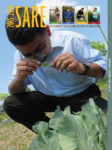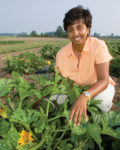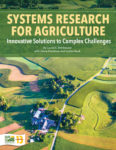Showing 51-60 of 150 results

2017 National Conference on Cover Crops and Soil Health
Session recordings are available from the second National Conference on Cover Crops and Soil Health. The event served as an opportunity to learn recent developments in how cover crops are being used by innovative farmers across the country and gain important insights on improving soil health from producers, conservation leaders and scientists. It was held December 7-8, 2017 in Indianapolis.

Recordings of General Sessions
Opening remarks by Jane Hardisty (USDA-NRCS Indiana) with video message Bill Northey (Iowa Secretary of Agriculture) Keynote: Growing a Revolution - Bringing Our Soil Back to Life, by David Montgomery (University of Washington) Farmer panel: Experiences with Cover Crops and Soil Health, with Dan DeSutter (Ind.), Trey Hill (Md.) and Jimmy Emmons (Okla.) Top 10 Ways Cover Crops Build Soil Health, by Rob Myers (North Central SARE) Plenary session: Carbonomics, by Keith Berns (Neb. farmer and Green Cover Seed)

Digging into Soil Health
Soil Health Principles Soil Health Testing and Practices Soil Biology and Organic Matter

Cover Crop Role in the Cropping System
Cover Crops and Nutrient Management Cover Crop Impacts on Diseases and Insects Cover Crops, Herbicides and Dealing with Herbicide-Resistant Weeds

Economic and Environmental Aspects of Cover Crops
Economics of Cover Crops Business Opportunities with Cover Crops and Soil Health Environmental Impacts of Cover Crop Systems

Special Topics with Cover Crops and Soil Health
Organic and Specialty Crops Grazing Cover Crops Soil Health Policy Issues

2015/2016 Report from the Field
Read about SARE-funded work in the areas of sustainable dairy cropping systems, soil health assessments, nutrient management, cover crops, beginning farmers, pollinators, technical assistance programs for women farmers, and more. This edition includes highlights of projects funded through the graduate student program, and the highly regarded Sustainable Agriculture Fellowship, a professional development program coordinated by SARE and NACAA.

Cover Crop Innovators Video Series
Find short video profiles of farmers around the country who are using cover crops on their land.

National Continuing Education Program
This program is designed for Cooperative Extension and Natural Resource Conservation Service personnel, and is also open to farmers, ranchers, and other agricultural professionals nationwide. It emphasizes core concepts and a basic understanding of sustainable agriculture, its goals and its relevance to every farming and ranching operation—large or small. The core of the national continuing education program is a series of three online courses. Take them now.

Systems Research for Agriculture
Practical information for researchers, educators and extension professionals seeking to understand and apply systems research to agriculture.